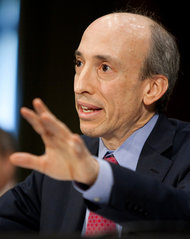 Joshua Roberts/Bloomberg NewsGary Gensler, chairman of the Commodity Futures Trading Commission, testifying at a Senate Agriculture Committee hearing.
Joshua Roberts/Bloomberg NewsGary Gensler, chairman of the Commodity Futures Trading Commission, testifying at a Senate Agriculture Committee hearing.
8:22 p.m. | Updated
Federal regulators are considering a flurry of new rules for the brokerage industry after MF Global’s collapse and the revelation that customer money is missing from the firm, top officials told Congress on Thursday.
The Commodity Futures Trading Commission will vote next week on a rule that would restrict the industry’s use of customer money, and the Securities and Exchange Commission could soon enforce new accounting disclosures for brokerage firms. MF Global’s bankruptcy has also renewed calls for federal regulators to more closely monitor brokerage firms rather than continue to outsource oversight duties to for-profit exchanges like the CME Group.
Such self-regulatory organizations are “the front line” of oversight, Gary Gensler, chairman of the trading commission, told the Senate Agriculture Committee, which is examining MF Global’s downfall. The committee will hold a second hearing about MF Global on Dec. 13.
Mr. Gensler said he planned to complete new constraints on risky bets with customer money. Brokerage firms can now invest client money in a range of securities, including sovereign debt. Firms can also, in essence, borrow from their customers, using client money for a loan to the firm.
“We need to tighten that up,” Mr. Gensler told the committee. “I think it’s important that we limit how funds can be used.”
The agency planned to finish the rule earlier this year, but delayed the changes amid a fierce lobbying campaign by Jon S. Corzine, who at the time was the chief executive of MF Global. The rules were unnecessary, Mr. Corzine had argued, because federal laws already prevented brokerage firms from mixing client money with company money.
But in MF Global’s final days, the firm broke that sacrosanct rule. Investigators now fear that MF Global tapped anywhere from $600 million to $1.2 billion to meets its own financial obligations.
Regulators are also examining MF Global’s risky bets on European sovereign debt, positions that caused a crisis of confidence among ratings agencies, the firm’s creditors and regulators. MF Global financed those positions through off-balance-sheet deals known as “repurchase to maturity” transactions.
On Thursday, lawmakers asked why the firm was allowed to keep regulators in the dark about such transactions.
“That is a loophole so big you can drive a Mack truck through it,” said Senator Kent Conrad, Democrat of North Dakota. “If that’s not closed, we should ask ourselves what we’re doing.”
Mary L. Schapiro, chairwoman of the S.E.C., said her agency was already considering such a crackdown. The agency, Ms. Schapiro said, was also investigating whether MF Global violated accounting rules.
“We are investigating very carefully both the accounting treatment and the disclosure by the firm,” she said at the hearing.
Article source: http://feeds.nytimes.com/click.phdo?i=f4083dbcf2836343ac52bfa25b8b4e0e
Speak Your Mind
You must be logged in to post a comment.